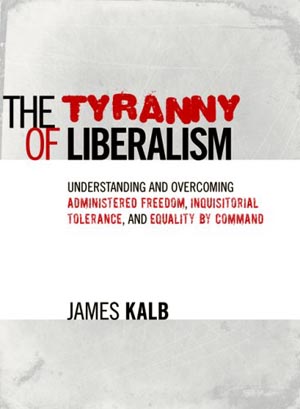If man is the measure, it cannot be right to tell him what to do. We cannot be forced to be free or ordered to be equal. Neither theoretical refinements nor practical compromises can resolve such basic contradictions or keep them from leading to unprincipled and irrational conduct that eventually proves self-destructive.
Savor that felicitous prose. It is a sample of what awaits those who read James Kalb’s The Tyranny of Lib-eralism, 289 pages of text followed by ample documentation and references. Kalb says what many of us have not been quite able to articulate. He identifies the cracks in the foundation on which modern liberal sensibilities rest, cracks which all of us knew had to be there, but found difficult to spot.
Kalb loves language. There is a poignancy to his lamentation of its preempting by the Newspeak of the New World Order. His description of how liberals use the terms toleration, inclusion, and rationality can liberate even one educated in post-1960’s public schools, unless those institutions were successful in destroying his ability to think critically.
Kalb also loves tradition. He correctly assesses liberalism as a rejection of tradition, and with it the unwritten principles, many of which are based on religion, that allow people to live in the real world. Kalb accepts the Christian doctrine of Original Sin, which alone explains the limitations one must expect of human behavior. He also accepts the concept of natural law. He does not say that his understanding of natural law is Thomistic, but he definitely rejects the “nature” spoken of by philosophical materialists. The Declaration of Independence speaks of “nature and nature’s God.” Kalb uses similar language. I see little difference between Kalb’s concept of natural law and the Scholastic one.
The book is divided into two parts, which come down to problem and solution. Kalb summarizes the history of Western civilization, tracing the rejection of real knowledge and the rise of technocracy, bureaucracy, and the herd mentality that prevails among us now. He offers a very pessimistic analysis of our current situation, showing the difficulties in any attempt to resurrect real freedom and genuine intellectual endeavor. In the second half of his book, he offers some hope. Kalb understands that liberalism has no choice but to permit its own destruction if it remains true to its principles. And he offers us some practical advice for now, concerning homeschooling, using the internet, and generally staying below the radar of the bureaucracy.
Kalb is a Christian. He concludes that faith is the necessary item that will maintain tradition until it can reclaim its rightful place. “Our acts can make sense and be fruitful only as part of an order for good founded in the nature of things.” If those last four words remind you of a book by Marion Montgomery, be assured that Kalb has the same intellectual independence and would assert that objective knowledge is real and attainable, even as Montgomery would. Rejoice that another voice has been added to the movement to reclaim civilization.
[The Tyranny of Liberalism: Understanding and Overcoming Administered Freedom, Inquisitorial Tolerance, and Equality by Command, by James Kalb (Wilmington, DE: ISI Books) 330 pp., $28.00]

Leave a Reply